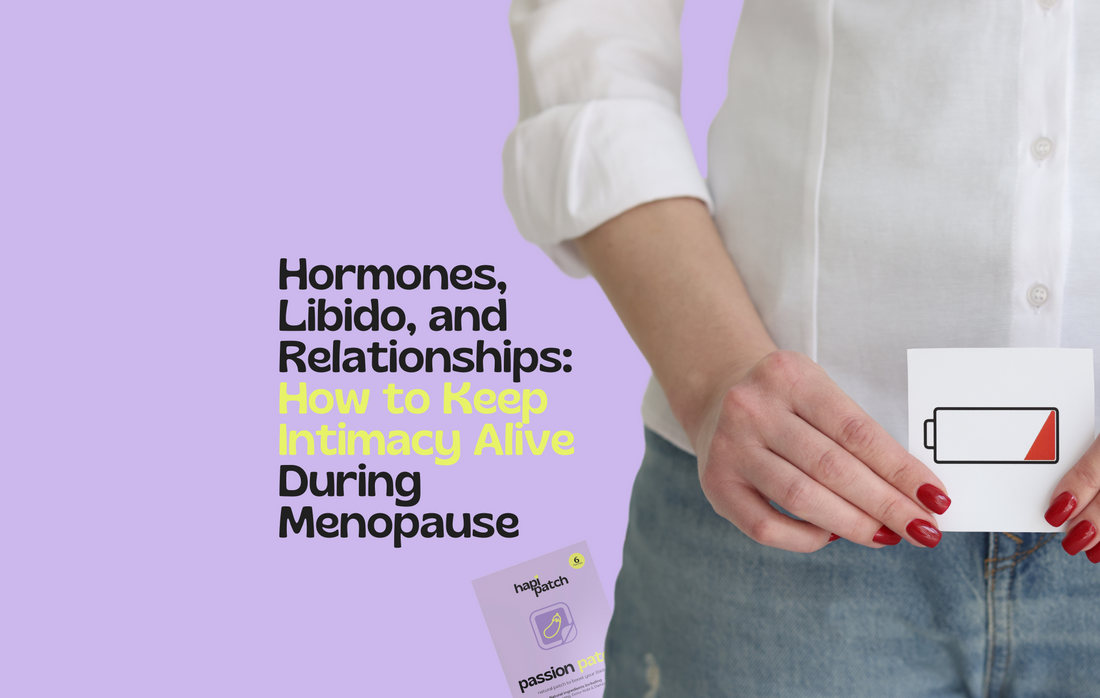Menopause is often associated with the end of a woman’s reproductive years, but it doesn’t have to be the end of intimacy or a satisfying sex life. For many women, the hormonal changes that accompany menopause—such as drops in oestrogen, progesterone, and testosterone—can significantly affect libido, mood, and even the dynamics of a relationship. These changes often lead to confusion, frustration, or distance between partners. However, with understanding, open communication, and the right natural support, couples can maintain or even deepen their intimacy during this phase of life.
In this blog, we’ll explore how hormonal changes during menopause impact libido, the emotional and psychological aspects of these changes, and how couples can work together to navigate these challenges. We’ll also discuss how The Passion Patch can be a key tool for reigniting sexual desire and restoring connection during menopause.
How Hormones Affect Libido During Menopause
Hormones such as oestrogen, progesterone, and testosterone are crucial in regulating sexual desire, mood, and overall energy levels. During menopause, the production of these hormones’ declines, leading to a range of physical and emotional changes that can dampen libido.
- Oestrogen Decline
Oestrogen plays a critical role in maintaining vaginal health and sexual desire. As oestrogen levels drop during menopause, women may experience vaginal dryness and thinning of the vaginal walls, making intercourse uncomfortable or even painful. This discomfort can lead to a reduced interest in sex.
- Testosterone Decline
Although testosterone is often considered a "male" hormone, it is essential for women’s sexual health as well. Testosterone supports libido, energy, and mood in both men and women. During menopause, women experience a decline in testosterone production, which can lead to a noticeable drop in sexual desire and overall vitality.
- Progesterone Fluctuations
Progesterone helps regulate mood and sleep patterns. When progesterone levels decline, many women experience mood swings, anxiety, and insomnia—all of which can make it difficult to feel emotionally or physically connected to a partner.
The Emotional and Psychological Impact of Menopausal Changes
The hormonal shifts during menopause don’t just affect physical health—they can also take a toll on emotional and psychological well-being. Women often experience changes in body image, self-esteem, and mood, which can impact their relationships. Some common emotional changes during menopause include:
- Body Image Issues: As women gain weight or notice changes in their skin, hair, and overall appearance during menopause, they may feel less attractive or less desirable. This can lead to a reluctance to engage in intimacy.
- Mood Swings and Depression: Hormonal fluctuations can cause mood swings, irritability, and even depression, which can affect a woman’s interest in sex and her ability to emotionally connect with her partner.
- Stress and Fatigue: Many women find that menopause brings additional stress, whether due to physical symptoms like hot flashes and night sweats or emotional challenges such as anxiety and difficulty sleeping. This stress can further diminish libido and strain relationships.
How Hormonal Changes Can Affect Relationships
The changes in libido and emotional well-being that occur during menopause can cause tension or confusion in relationships. Partners may feel rejected or frustrated if their attempts at intimacy are met with disinterest, while women may feel guilty or anxious about their decreased libido.
If these feelings are not addressed openly, they can create distance in the relationship. Both partners may feel disconnected or unsure of how to navigate the changes. However, it’s essential to remember that these challenges are normal and manageable with communication, patience, and understanding.
Rebuilding Intimacy During Menopause: Tips for Couples
Navigating intimacy during menopause requires effort from both partners. Here are some ways to maintain or rebuild intimacy as hormones and libido shift:
- Open Communication
The first step to maintaining intimacy during menopause is to have open and honest conversations about the changes you’re experiencing. Let your partner know how you’re feeling, both physically and emotionally. Share the challenges that hormonal changes are causing and how they’re affecting your libido. Encourage your partner to share their feelings as well, so you both understand each other’s perspectives.
- Be Patient with Each Other
It’s important to be patient with yourself and your partner as you both adjust to these changes. Menopause is a natural phase of life, but it can take time to figure out how to maintain intimacy. Be compassionate and understanding toward each other and allow space for trial and error as you explore new ways to connect.
- Explore Non-Sexual Intimacy
Physical intimacy doesn’t always have to involve sex. If you’re experiencing vaginal dryness, discomfort, or low libido, focus on other forms of closeness, such as cuddling, massages, or spending quality time together. Physical touch, even without sex, can help maintain emotional closeness and keep your relationship strong.
- Use Lubricants and Vaginal Moisturisers
If vaginal dryness is making intercourse uncomfortable, using lubricants or vaginal moisturisers can make sex more enjoyable. This can alleviate the discomfort caused by oestrogen decline and make it easier to maintain sexual intimacy.
- Prioritise Emotional Connection
Sometimes, the emotional connection between partners can become strained during menopause. Take time to prioritise emotional intimacy by talking openly, spending quality time together, and doing activities that strengthen your bond. Feeling emotionally connected can often reignite physical intimacy.
How The Passion Patch Can Help Reignite Libido During Menopause
If you’re looking for a natural way to boost libido during menopause, The Passion Patch is a powerful solution. Designed to support hormonal balance and enhance sexual desire, The Passion Patch delivers a blend of natural ingredients directly through the skin using transdermal technology. This method ensures efficient absorption and provides continuous support for libido, energy, and mood.
Key Ingredients in The Passion Patch:
- Tribulus Terrestris: This herb is known for its ability to naturally increase testosterone levels, which helps support libido in both men and women.
- L-Arginine: L-Arginine improves blood flow, which is essential for physical arousal. By increasing circulation to the genital area, this amino acid enhances sensitivity and sexual pleasure.
- Ginseng Extract: Ginseng helps reduce stress and fatigue, two factors that can significantly impact libido during menopause.
- Damiana Extract: Known for its mood-enhancing properties, Damiana helps reduce anxiety and improve sexual desire, making it easier to reconnect with your partner.
How It Works:
The Passion Patch uses transdermal delivery to provide a steady release of active ingredients over 24 hours. This continuous release helps maintain consistent libido support without the spikes and crashes associated with other supplements. By boosting testosterone, improving blood flow, and enhancing mood, The Passion Patch can help reignite sexual desire and make intimacy more enjoyable during menopause.
The Science Behind Transdermal Delivery
Unlike oral supplements, which must pass through the digestive system and can lose potency, transdermal patches deliver ingredients directly through the skin and into the bloodstream. This allows for more efficient absorption and ensures that the active ingredients maintain their full strength. The 4-layered matrix design of The Passion Patch releases ingredients gradually over 24 hours, providing consistent libido support throughout the day.
FAQ: Menopause, Libido, and Relationships
- How does menopause affect libido?
During menopause, the decline in oestrogen and testosterone can lead to a decrease in sexual desire, vaginal dryness, and discomfort during sex, all of which can impact libido.
- Can The Passion Patch help improve libido during menopause?
Yes, The Passion Patch delivers natural libido-boosting ingredients through transdermal technology, supporting hormone balance, improving circulation, and enhancing sexual desire.
- How can couples maintain intimacy during menopause?
Open communication, patience, and exploring new forms of intimacy—such as cuddling, massages, or non-sexual touch—can help couples maintain emotional and physical closeness during menopause.
- What role do hormones play in libido during menopause?
Hormones like oestrogen, testosterone, and progesterone regulate sexual desire and mood. As these hormones decline during menopause, many women experience a decrease in libido.
- Is it normal for relationships to feel strained during menopause?
Yes, it’s common for couples to experience tension or confusion during menopause due to changes in libido and emotional well-being. Open communication and mutual understanding can help navigate these challenges.

